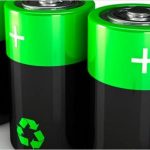
Layered oxides may be the key to extending the life of the environmentally-friendly zinc-ion battery
Sunday, April 01, 2018 by David Williams
http://www.futuresciencenews.com/2018-04-01-layered-oxides-may-be-the-key-to-extending-the-life-of-the-environmentally-friendly-zinc-ion-battery.html

The future of battery storage technology hangs in the balance. The standard lithium-ion battery technology that is widely used today, as it turns out, may not be the best solution for large-scale applications due to a number of reasons. Now a team of researchers has developed a way to create a viable alternative, in the form of zinc-ion batteries that not only offer much higher capacity but are also cheaper to build as well.
Although fairly reliable and highly versatile, lithium-ion batteries are not without shortcomings. They power many different kinds of now-ubiquitous electronic devices, such as smartphones, laptops, and other gadgets, but they are not that efficient when it comes to retaining energy for large-scale applications. They also pose certain safety issues, such as toxicity, so it’s important to search for something else to use in its place.
Researchers from the King Abdullah University of Science and Technology (KAUST) may have created just the thing that’s needed. It is said that microwave synthesis of layered oxides leads to the creation of aqueous zinc-ion batteries. Some of the details of this finding have been reported online on the official KAUST website.
According to Husam Alshareef, the lead researcher on the study, they went down the zinc-ion battery route since those types of batteries use a water-based electrolyte, which is air-stable, cheap, and environmentally friendly. “Aqueous batteries based on zinc ion can offer a safer, cost-effective solution to lithium-ion batteries for grid storage,” he explained. “Further, they use more environmentally friendly materials than lead-acid batteries.”
Both zinc-ion and lithium-ion batteries work in a similar fashion, by storing ions in an electrode. While the batteries are charging, the ions typically flow through an electrolyte, going from one electrode to another, where they end up being captured through a process known as intercalation. So the researchers knew that the key to optimizing a battery’s performance was to focus on improving the processes involving the electrode materials.
Vanadium-based compounds have shown great promise in this regard, perhaps owing to their layered and open atomic-crystal structure, which leaves plenty of space available in order to trap and store zinc ions in. The research team devised a method to quickly synthesize ultralong zinc pyrovanadate (Zn(NO3)2·2H2O) cathodes then mixed it with commercial NH4VO3 powder that had been dissolved in deionized water.
The researchers then blasted microwave radiation right to the mixture to see what kind of reaction occurs. They dried the resulting material from it before attempting to use it in a battery.
What the researchers found was that their zinc-ion battery was able to achieve an energy density of up to 214 watt-hours per kilogram, which is a lot higher than earlier reported aqueous zinc-ion batteries. Because of their successful attempt at making a more stable and more energy efficient version of a zinc-ion battery, the researchers have concluded that their microwave-based technique could also apply to creating other types of metal compounds.
According to Chuan Xia, a Ph.D. student and a lead author on the study, “We have already made compounds in which zinc is replaced with other cations that create larger metal-oxide polyhedra that are able to intercalate even higher amounts of zinc ions.” It will likely only be a matter of time until an actual commercial application of this new zinc-ion battery technology becomes available. For now, the researchers are going to want to polish their methods and see how well it can scale.
Read more about recent innovations in battery technology in Power.news.
Sources include:
Tagged Under: Tags: batteries, battery storage, Chemistry, discoveries, future tech, KAUST, lithium ion, microwave, portable power, power grid, power storage, solar power, zinc, Zinc-ion





